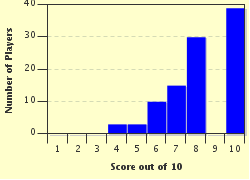Quiz Answer Key and Fun Facts
1. Short for "malicious software"
2. A program usually designed to "kidnap" your files by encrypting them unless you pay money
3. An attack on a web server intended to prevent others from accessing or otherwise using it
4. Type of malware named for a famous Greek horse
5. Name of a type of malware taken from a 1970s sci-fi novel
6. Gain access to a network by pretending to be someone or something else
7. Originally a sociology term, it also refers to manipulating people to give access to personal or confidential information
8. Named from combining the word for the UNIX administrative account with 'kit', meaning software
9. A hacked computer that can be used remotely to conduct further illegal activity
10. Malicious software that claims a computer is infected and manipulates a user into paying for removal or downloading a real virus
Source: Author
AlexT781
This quiz was reviewed by FunTrivia editor
rossian before going online.
Any errors found in FunTrivia content are routinely corrected through our feedback system.


